Victorious Admiral Heihatiro Togo
“There are no great people without ordinary people”
Japanese proverb
Probably everyone who knows at least something about the Russo-Japanese War of 1904-1905 and who read the novels of Novikov-Priboy and Stepanov knows the name of Admiral Togo, who commanded the United at that time. fleet Japan. But in what way did this man reach his position, what is his combat biography? This is what our story will be about today.
Admiral Togo on a trip to the United States at West Point Academy, New York, in August 1911.
The future Admiral 22 was born on December 1847 of the year in the small town of Kadzia (Kagoshima Prefecture) in the province of Satsuma on the island of Kyushu. And this is the most south-western among all the other large Japanese islands, which was closest to Korea and China, and it was there that the Portuguese navigators were the first to reach. The famous port Nagasaki was also located here - for centuries the only place where Dutch merchants could come. The Satsuma samurai were daring. It was they who fled from the battlefield at Sekigahara, but broke through the Tokugawa troops, and then were the first among those who revolted against the power of bakufu and supported the Meiji revolution. No wonder that many Japanese sailors came from here. Looking at foreign ships, not one young Japanese dreams then about long voyages and adventures in overseas countries.
Let's get acquainted with Japanese painting in the ukiyo-e genre in the period of the Sino-Japanese War, when it gained its lost popularity again and, at the same time, we could get acquainted with the pictorial art of Japan during the life of Admiral Togo. Then the artist Mizuno Toshikata (1866 –1908), who painted triptychs with illustrations of military scenes, became one of the brightest representatives of the military direction of Ukiyo-e. This picture shows Lieutenant Commander Sakamoto on board the warship Akagi.
In Japan at that time there was a tradition to give children several names, or rather, to change their names as they grow up. So Togo, as soon as he turned 13 years old, changed the child's name Nakagoro to Heihatiro. In the yard stood meanwhile 1860 year. The “Overseas Devils” had already been in charge of the country for six years, and foreigners' ships approached the shores of the “Land of the Gods” one by one, and there was no escape from them. However, sometimes strikes on vanity are only useful. A year after the visit of Commodore Perry to Japan, all the same Nagasaki invited Dutch officers to teach the Japanese tactics, navigation and shipbuilding at the newly opened naval school. A metallurgical plant and a shipyard were also built here. Already in 1872, the Japanese fleet consisted of 17 warships, including the battleship Kotetsu, the legendary Stonewall, a battleship of southerners bought by the Japanese from the United States.
On the deck of a Japanese warship. Work Mizuno Toshikata. (Museum of Fine Arts, Boston)
Togo was 17 years old when ships of the combined Anglo-American-French squadron fired at the port of Shimonoseki. This is how the right of the strong was affirmed, and Togo saw that he who is strong in the sea becomes strong on earth. It is therefore not surprising that in 20 years he entered the service at the maritime office, opened on the island by the Satsuma clan. Two years later, in 1869, becoming a sailor by this time, he took part in a battle with the rebellious ship of the Tokugawa clan on the ship “Kasuga”.
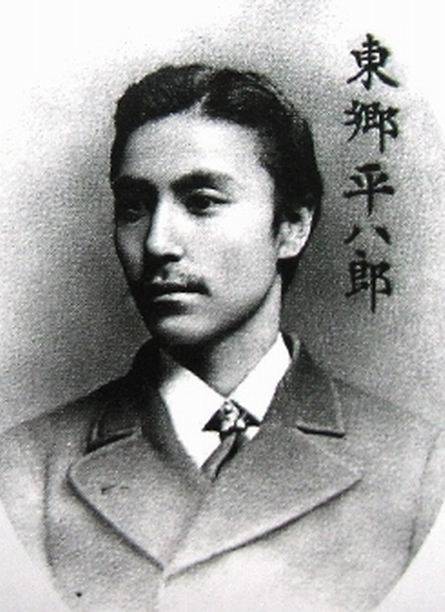
Young Heyhatiro Togo during his studies in England.
Again, there is nothing surprising in the fact that when, in 1870, in Japan, a military ministry was created, divided three years later into a military and maritime ministry, it was the samurai from Satsuma who ended up in this important institution. With combat experience behind, Heyhatiro enrolled at the Tokyo Marine School in 1871. But it was difficult to study marine business in modern ships in Japan at that time. Therefore, Togo among the 12 cadets were sent to study in England. Well, her success in Russia in the Far East was, of course, unpleasant, and in order to counter the growing power of such a country as Japan, the British began to train Japanese naval officers, and English shipyards began to build warships for the Japanese fleet.
Japanese troops cross the Yalu River. October 1894. Work Mizuno Toshikata. (Museum of Fine Arts, Boston)
In distant England, Togo spent a long seven years! He studied at Cambridge (studied mathematics), maritime in Portsmouth and Greenwich, underwent excellent maritime practice during a voyage around the world on the Hampshire ship, oversaw the construction of the Fuso battleship at the Greenwich shipyard. At home in 1879, he returned aboard the new ship Hiei. And then, after such a study, began a rapid career growth. Already in the 1880 year, Togo received the rank of lieutenant commander, in 1882, he was the assistant commander of the gun boat “Amagi”, and three years later at the age of 38 years he became her commander. In 1887, he was promoted to captain of the 1 rank, after which he commanded cruisers until 1894, and was head of the Kure naval base. On the eve of the Sino-Japanese War, Togo became the commander of the cruiser Naniwa, one of the newest ships of the Japanese fleet. Commanding this ship, Togo earned himself excellent publicity and became famous not only in Japan, but throughout the world.
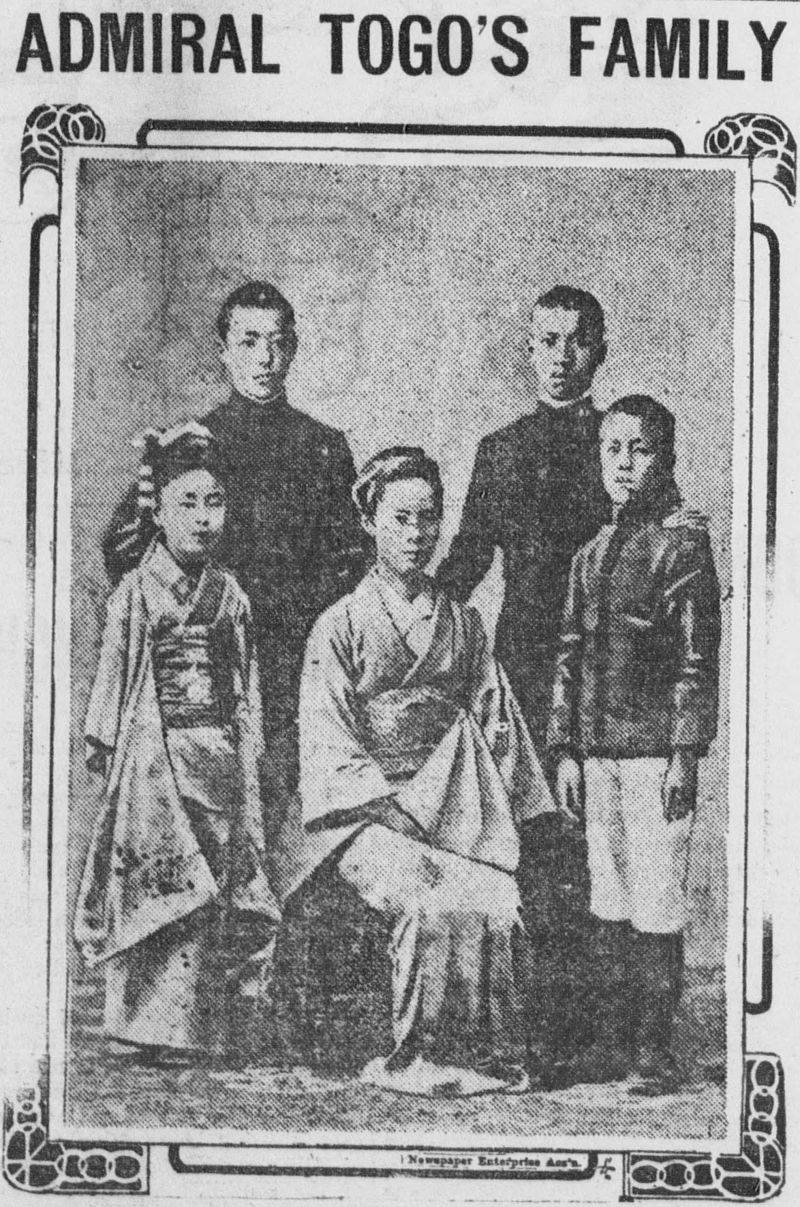
Togo's family: his wife and four sons.
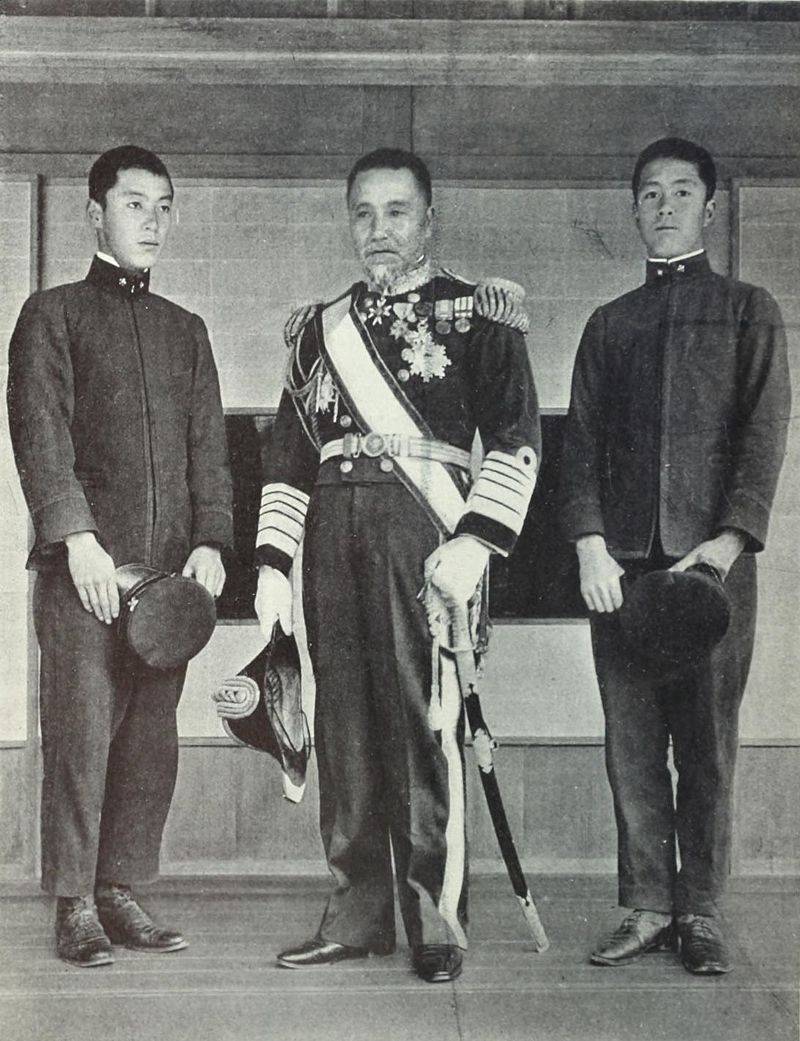
Admiral Togo and his two older sons.
It was like this: in the morning of July 25, on ships of the Japanese squadron, which included the cruiser Naniwa, the cruiser Ji Yuan, gunboat Guani and English transport Coaching (Gaoshen) carrying Chinese troops noticed. The commander of the detachment, Admiral Tsuboi, ordered to engage in battle with the Chinese ships, on which heavy fire was opened. Very soon, the Chinese cruiser, raising white and Japanese flags, was able to sneak away from the battlefield under the cover of fog, while the gunboat Guani, under fire from Naniwa and Akitsushima, was so badly damaged that its commander sent the rest of the crew to the shore, and the ship itself blew up. And here the Japanese noticed “Coaching”. The order to stop and inspect the ship went to Heyhatiro Togo. It turned out that this vehicle, commanded by English captain Galsworthy, with a European team and an English flag, had on board 1200 Chinese soldiers, 14 cannons and various other weapons. A Japanese officer sent to inspect the ship ordered the captain to follow the cruiser.
After the battle of Weihwei, the commander of the Chinese fleet surrenders. November 1895. Job Mizuno Toshikata. (Museum of Fine Arts, Boston)
But the Chinese soldiers, who were not at all smiling at the prospect of being taken prisoner by the Japanese, demanded that the captain continue to move and not obey, threatening to kill all Europeans on board otherwise. Then Togo ordered the Europeans to leave the ship, and when the torpedo didn’t hit it, he opened fire with 152-mm guns. As a result, the transport quickly sank with all who were on board. Only the captain and two members of his team escaped; and another 147 man was rescued by a Korean ship. Tsuboi headed for the connection with the main forces, demonstrating to the world the determination of the Japanese to fight, not paying attention to the flag of the ship.
In a battle with the Chinese cavalry. The work of Kokunimas Utagawa (1874-1944). His work belongs to the final period of development of traditional Japanese woodcuts. He is known as the author of engravings with images of the Japanese-Chinese (1894-1895) and Russian-Japanese wars (1904-1905). Paying tribute to the traditions of Ukiyo-e, the artist created genre paintings, where the heroes of his engravings were samurai warriors and beautiful women, picturesque scenes of the everyday life of foreigners living in Japan, their customs and customs.
In a battle with Chinese soldiers. Work Kokunimisa Utagawa.
Then Togo distinguished himself in the famous battle of the Yalu River, where Tsuboi’s “flying squadron”, including the “Naniwa”, was able to cover the right flank of the Chinese fleet at the very beginning of the battle and force the Chinese cruisers “Janvey” and “Chaoyun” to fall ashore. After this battle, the Chinese fleet no longer dared to go to sea and remained in Weihai, which the Japanese first blocked and then laid siege to. The cruiser "Naniwa" actively participated in all these actions against the Chinese, so that at the end of the war, Togo received its first admiral rank. Then in 1896, he was appointed head of the highest naval school, and two years later promoted to vice-admiral.
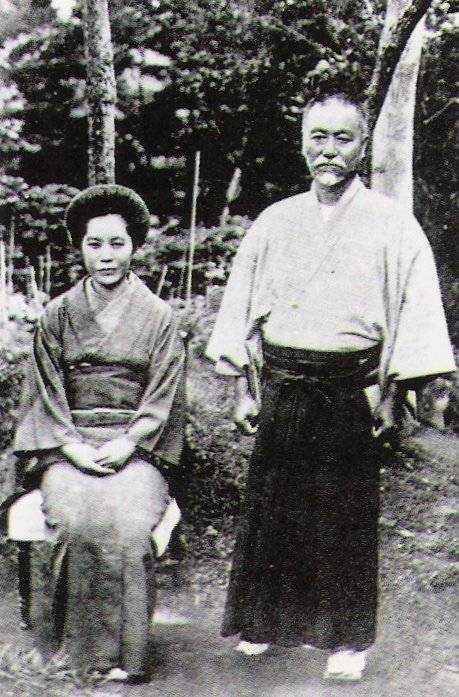
Admiral Togo with his wife Tetsu in 1913.
The Boxer Rebellion in China forced Japan to work with the Europeans together. The squadron of the Japanese fleet, which arrived to help the ships of the European powers, again commanded Togo. After China, he had a “respite”: the post of the head of the base in Maizuru. But already in 1903, a sharp increase followed - he was appointed to command the United Fleet, and in 1904 he was given the rank of full admiral, in which rank he led the Japanese Navy's naval operations in the 1904-Russian war.
As is known, the Japanese fleet was the first to start fighting, attacking Russian ships in the port arbor of Port Arthur on the night of January 27 1904. The cruiser "Varyag" and the gunboat "Koreyets" were destroyed in the port of Chemulpo, and the First Pacific Squadron was blocked in Port Arthur. All this made it possible for the Japanese to land troops without hindrance in Korea, and then in Manchuria. True, in the person of Vice-Admiral S.O. Makarov, who arrived in Port Arthur, met Togo with a worthy adversary, but after his death the initiative completely passed into his hands. Despite the death of two of his battleships, Togo managed to successfully conduct the 28 battle of July against Rear-Admiral Vitgeft's port-arthur squadron and eventually forced her to return to the blocked Port Arthur, where her ships eventually all died.
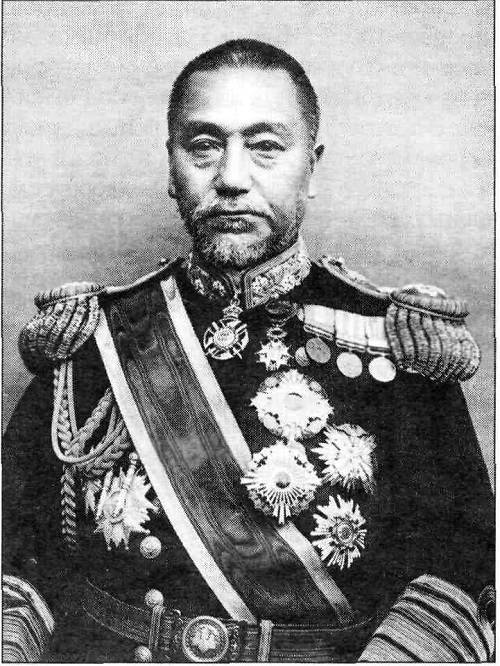
Togo - the commander of the United Fleet.
In command of the fleet, Heihatiro Togo tried in every battle to have superiority in strength over his adversary, using intelligence data and good speed of his ships. Using radio communications, the Japanese ships informed their admiral on time about the approach of the Second Pacific Squadron, after which what happened happened. However, it is worth paying attention to such an important moment as the ability to understand and use the mentality of its people for the benefit. Being a big fan of English admiral Nelson, he creatively changed his signal given to them before the Battle of Trafalgar. Then the English admiral handed over to the ships (in any case, it is considered so) the signal of the following content: "England hopes that everyone will do their duty." And it was good for the British! Heyhatiro Togo was Japanese, and he did not blindly copy Nelson, but changed him like this: “The fate of the Empire depends on this battle. Let everyone do their duty! ”With this, he was so inspired by the crews of ships that the commanders developed the rate of fire for their guns and literally bombarded the Russian ships with their shells. In parade uniform and with a sword, he spent the entire battle not in the armored wheelhouse, but from the upper bridge of the battleship Mikasa. An 305 man was injured by pieces of an 17-mm projectile exploded at the bridge, but not a single one of them was touched by the admiral. This is truly fate - so fate!
Japanese field hospital. Work Kokunimisa Utagawa.
After winning the Battle of Tsushima, Togo turned into a national hero of the country and was awarded the highest awards of Japan, and also appointed Chief of the Main Naval Staff. From 1909, he was a member of the Supreme Military Council, and in 1911, together with General Baron Nogi, he visited England and the United States, where he met with the top leadership of these countries. In 1913, he was awarded the honorary title of Marshal of the Fleet.
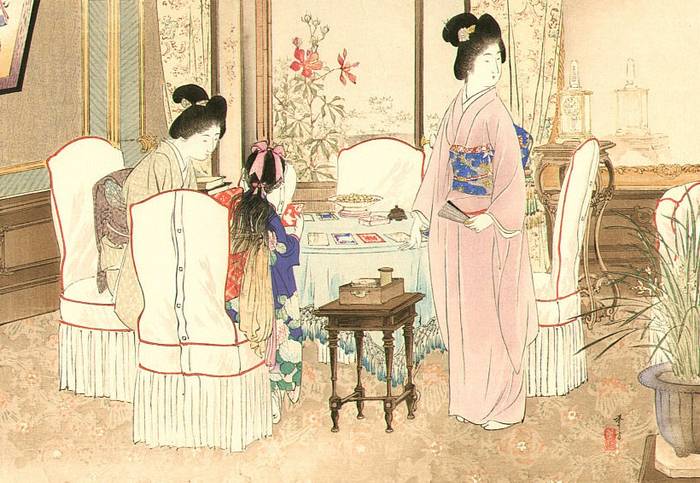
After the Meiji revolution in Japan, everything changed a lot, and artists noticed it. Now the Japanese could swim, like European women. Work Kokunimisa Utagawa.
New Japanese living room. Work Kokunimisa Utagawa.
Although he did not hold high posts in World War I, he was engaged in a very responsible business - he was one of the educators of the heir to the throne, Prince Hirohito - the future emperor. After the end of the war he retired. But he, of course, continued to play a certain role in the military leadership of the country, and, of course, he was considered with his opinion. In the 1934 year of Togo, apparently in honor of the 30 anniversary of the war 1904 - 1905, he received the title of Marquis and the next day, 30 in May, died at the age of 86 years.
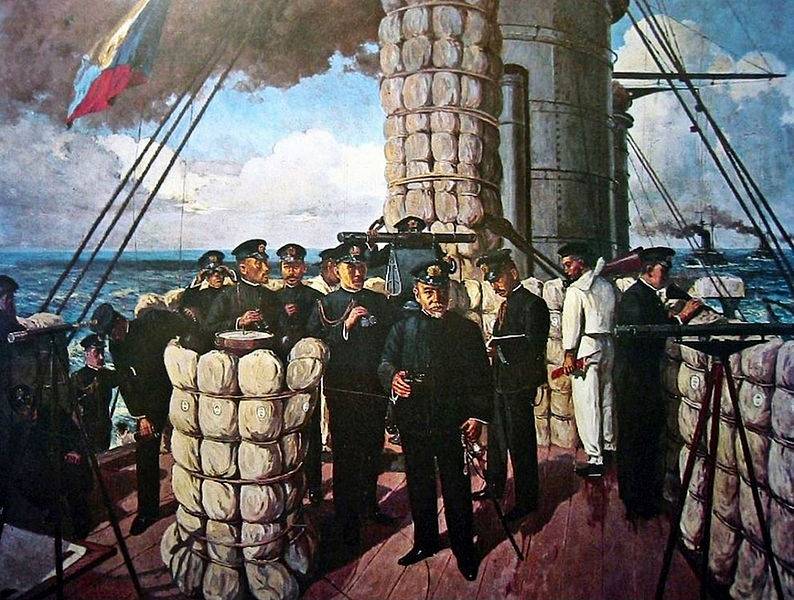
Japanese painting became modern with time. A picture of Tojo Sotaro (1865 - 1929) “Admiral of Togo on the bridge of the battleship“ Mikasa ”during the battle in the Tsushima Strait,” written by him in the year 1906.
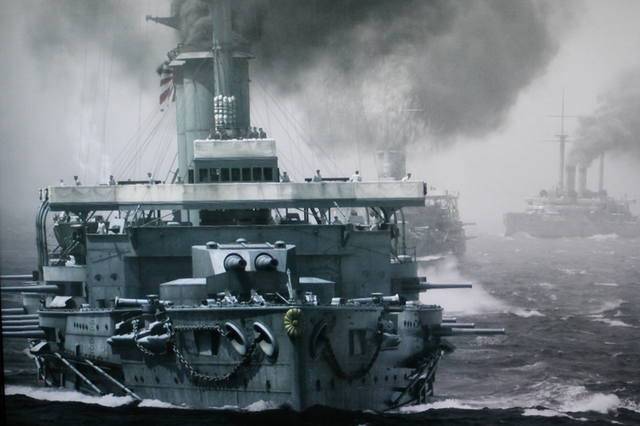
"Mikasa" from the 13 series of the series "Clouds over the Hills", dedicated to the Tsushima battle. Unlike the 1969 movie “Battle in the Sea of Japan”, the flagship battleship of Admiral Togo is reproduced in it with almost perfect accuracy.
It would not be an exaggeration to claim that it was Togo and its closest comrades-in-arms that Japan owes its victory in the Russian-Japanese war, and its naval power became so significant that it turned into a threat to the fleets of great powers. Togo went upstairs with his fleet and his country, which in the early twentieth century experienced an extraordinary rise in all spheres. But these victories on land and at sea caused a feeling of excessive self-confidence in the Japanese, and most importantly, gave them reason to establish themselves in the opinion that the most correct path in world politics is military. All this gave rise to their aggressive policies in the Pacific, Southeast Asia and China, and later led to a clash with European powers and the United States, the attack on Pearl Harbor and eventually a global national disaster 1945 of the year!
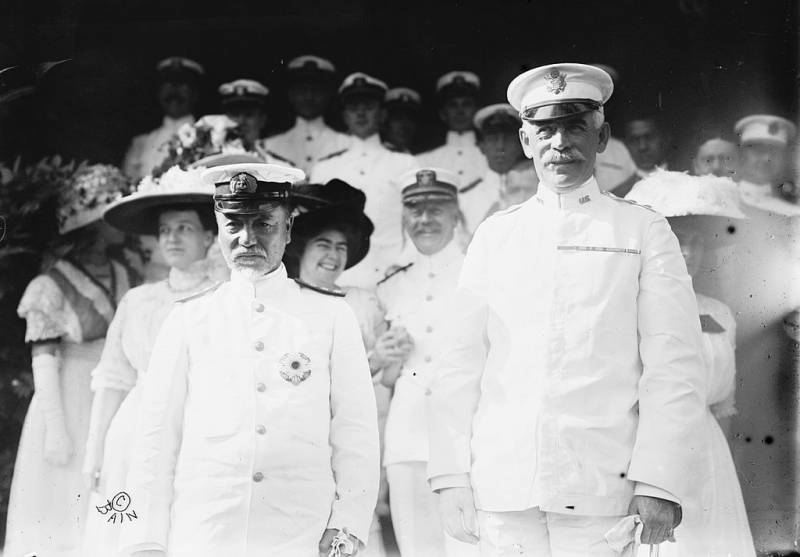
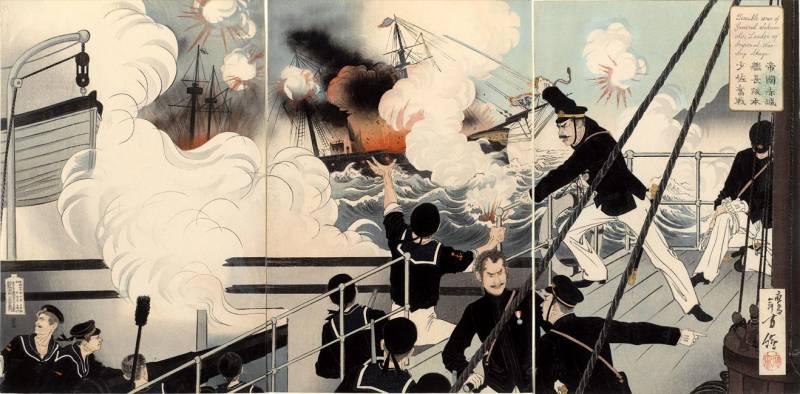
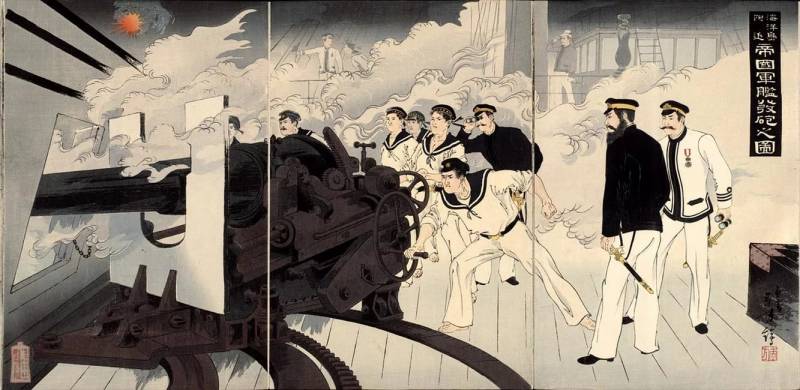
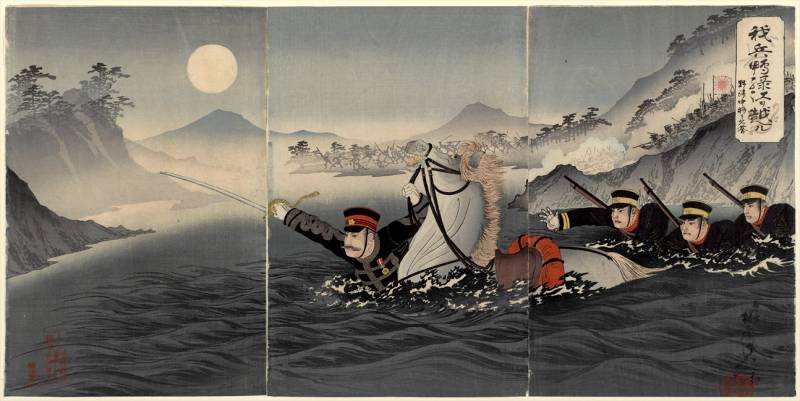
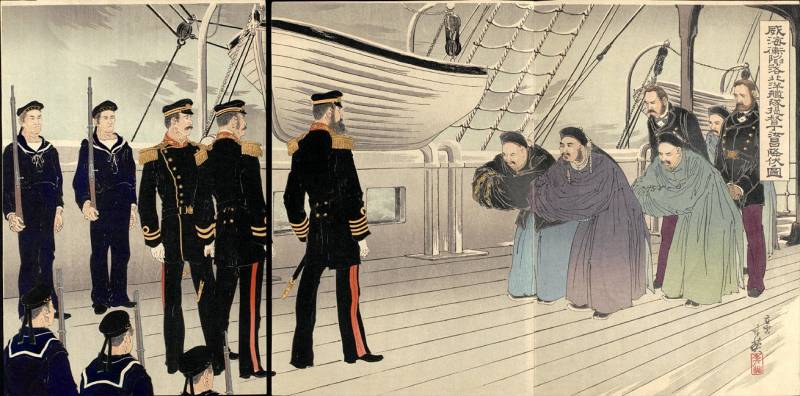
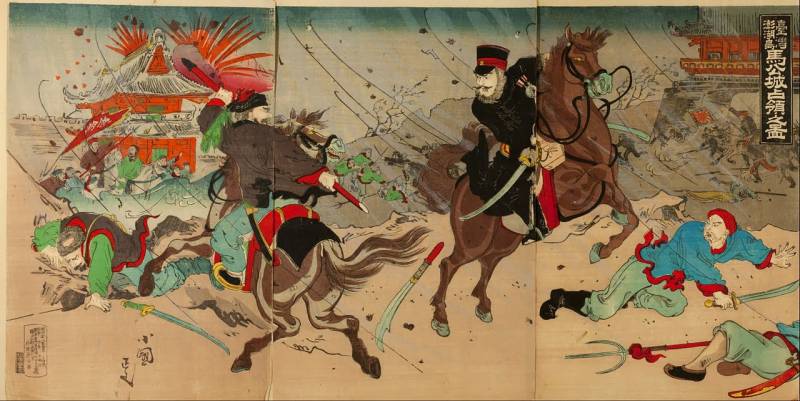
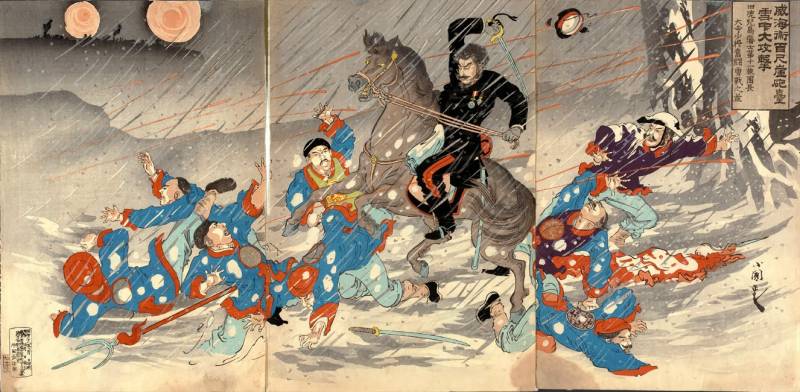
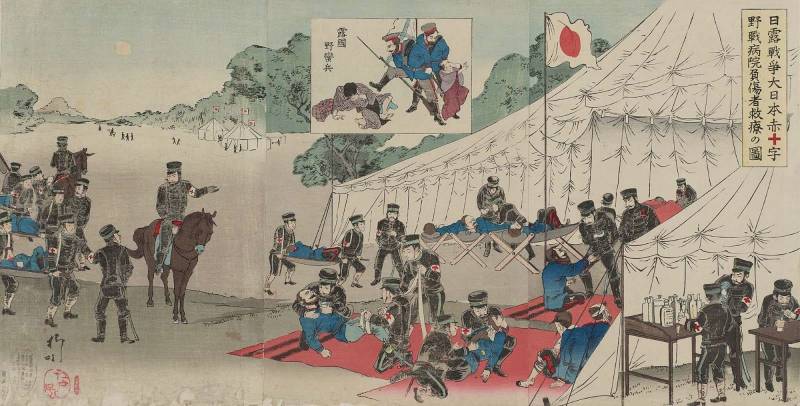
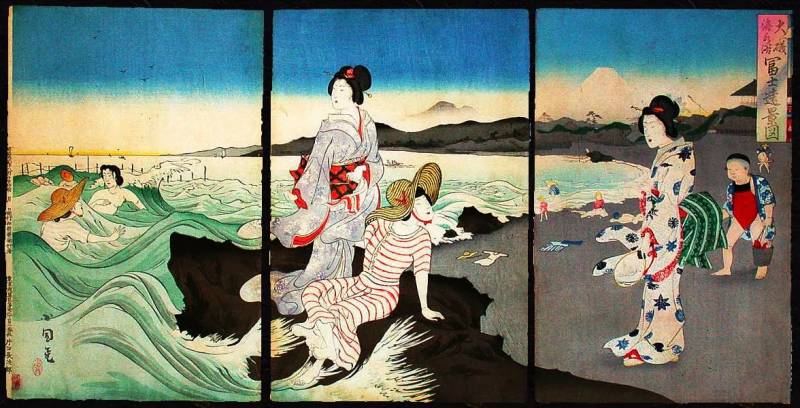
Information